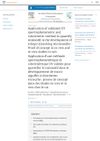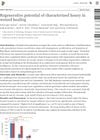 1 citations,
October 2021 in “Clinical, Cosmetic and Investigational Dermatology”
1 citations,
October 2021 in “Clinical, Cosmetic and Investigational Dermatology” Vitamin B3 may help prevent hair loss and promote hair growth by protecting scalp cells from stress and reducing hair growth-blocking proteins.
[object Object]  1 citations,
January 2021 in “Journal of the Dermatology Nurses’ Association”
1 citations,
January 2021 in “Journal of the Dermatology Nurses’ Association” The convention discussed various skin conditions and treatments, and highlighted the importance of vaccinations for patients on immune-altering medications.
 January 2025 in “Cosmetics”
January 2025 in “Cosmetics” Astragalus sinicus extracts may help promote hair growth and treat hair loss.
July 2024 in “International Journal of Molecular Sciences” The inhibitor DPP can promote hair growth.
 November 2023 in “International Journal of Medical Sciences”
November 2023 in “International Journal of Medical Sciences” New regenerative medicine-based therapies for hair loss look promising but need more clinical validation.
 October 2023 in “Biomaterials”
October 2023 in “Biomaterials” Nanotechnology could improve hair regrowth but faces challenges like complexity and safety concerns.
 June 2023 in “Antioxidants”
June 2023 in “Antioxidants” Lipids from Schizochytrium sp. help prevent hair loss by protecting hair cells from damage and promoting hair growth.
May 2023 in “Clinical, Cosmetic and Investigational Dermatology” More personalized and effective treatments for androgenetic alopecia are needed.
35 citations,
August 2016 in “Experimental Dermatology” Fullerene C60 shows promise as a new treatment for various skin conditions.
 25 citations,
February 2022 in “JAAD International”
25 citations,
February 2022 in “JAAD International” Some COVID-19 patients lose hair, with the most common type linked to male hormones and possibly increasing the risk of severe illness.
1 citations,
January 2021 in “Indian Dermatology Online Journal” PRP can help treat hair loss but needs standardized methods for best results.
 October 2024 in “Cosmoderma”
October 2024 in “Cosmoderma” Proper hair care and suitable products are essential for men's scalp health and well-being.
Aesthetic rehabilitation techniques can improve life quality and wellbeing for disabled patients.
[object Object] February 2024 in “Pharmaceutics” Microneedles with extracellular vesicles show promise for treating various conditions with targeted delivery.
November 2022 in “Cureus” New biomaterial treatments for baldness show promise, with options depending on patient needs.
 July 2021 in “Journal of dermatology research and therapy”
July 2021 in “Journal of dermatology research and therapy” Using combined treatments can help manage acne by targeting the bacteria and skin changes that cause it.
 November 2023 in “Cureus”
November 2023 in “Cureus” Magnetized saline water lotion increased hair growth in men with hair loss.
 May 2024 in “Journal of cosmetic dermatology”
May 2024 in “Journal of cosmetic dermatology” "Dutasteride 0.5 mg daily is the most effective treatment for male hair loss."

Garlic can help hair grow by activating certain growth pathways, and it works whether you eat it or apply it to your scalp.
 May 2023 in “International Journal of Trichology”
May 2023 in “International Journal of Trichology” A witch-hazel-based 5% minoxidil solution is effective and safe for women with hair loss who didn't respond to regular minoxidil, especially if they're sensitive to propylene glycol.
 March 2024 in “International Journal of Pharmaceutics”
March 2024 in “International Journal of Pharmaceutics” Ginsenoside Rg3 combined with minoxidil was more effective in treating hair loss in mice.
 December 2023 in “Annales Pharmaceutiques Françaises”
December 2023 in “Annales Pharmaceutiques Françaises” The UV–Vis Spectrophotometry method effectively measures minoxidil in rat skin for alopecia treatment.
 May 2023 in “Journal of Cosmetic Dermatology”
May 2023 in “Journal of Cosmetic Dermatology” Using platelet-rich plasma, basic fibroblast growth factor, and minoxidil together significantly increases hair count and growth rate in people with hair loss.
 January 2022 in “International Journal of Nutrology”
January 2022 in “International Journal of Nutrology” Diet and nutrients, including lycopene from tomatoes and hydroquinone from wheat, can help control melasma, a skin condition.
 January 2016 in “Frontiers in Bioengineering and Biotechnology”
January 2016 in “Frontiers in Bioengineering and Biotechnology” Honey applied to wounds speeds up healing and improves tissue repair.
10 citations,
November 2017 in “Skin Appendage Disorders” Erosive pustular dermatosis in elderly people may be linked to aging immune systems and skin damage.
 6 citations,
April 2022 in “Biomedicine & pharmacotherapy”
6 citations,
April 2022 in “Biomedicine & pharmacotherapy” Using three different drugs together may better treat eye diseases like glaucoma and macular degeneration.
 5 citations,
February 2022 in “Acta Biomaterialia”
5 citations,
February 2022 in “Acta Biomaterialia” Nanomaterials can improve hair care products and treatments, including hair loss and alopecia, by enhancing stability and safety, and allowing controlled release of compounds, but their safety in cosmetics needs more understanding.
 1 citations,
September 2021 in “Skin appendage disorders”
1 citations,
September 2021 in “Skin appendage disorders” Botulinum toxin injections can help treat common hair loss in men, but more research is needed to confirm this and understand how it works.
 July 2023 in “Journal of Indian System of Medicine”
July 2023 in “Journal of Indian System of Medicine” Ayurveda can help treat premature hair graying with lifestyle changes and herbal remedies.





















